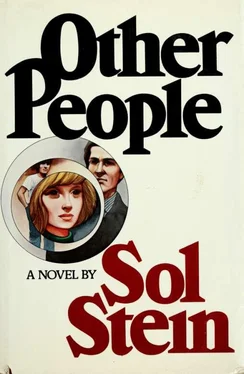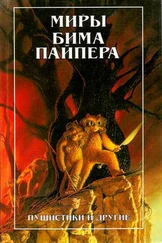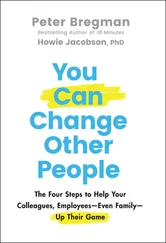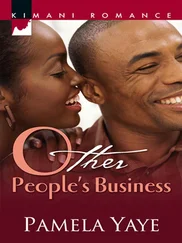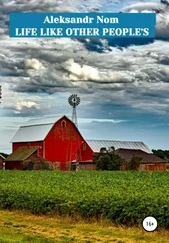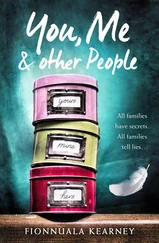I got on pretty well. People who knew me didn't tangle with me unnecessarily. I learned the rules for getting around other people's rules. I was ready for the Turks, any time. But I wasn't all strength. If I was stronger I could face up to the idea of sorting out the baggage in my head on Dr. Koch's couch, but I wasn't about to show my doctor how I had put myself together. It'd be giving some of my strength to a weaker person. I suppose that might explain why I didn't get married. When I was in my twenties, everybody else did, but the idea seemed a burden I could do without. If the Turks came, I didn't want to protect a wife also. The trouble is you meet a woman like Francine and you wonder who would be protecting whom. She's young and there's a lot she doesn't know yet, but she's learned at a rate that might put her ahead of me in know-how when she's my age. She's self-sufficient. She's willing to share her life, which makes her stronger. Once I had a crazy feeling that if I ever lived with a woman, she'd have to be a Turk to start with so I'd know I was in the enemy camp!
Well, this evening I didn't want to think about any of that, I wanted to drift, do nothing in particular, take my shoes off, read through the junk mail I should have thrown away unopened. Nothing on the television schedule made me want to turn the damn set on. I picked up a novel I'd bought at the airport and never started. In the middle of page one my mind started to wander. There was a girl in the book, not like Francine, but it started me thinking of Francine, and I didn't want to think about Francine, but there I was doing it and the phone rang.
I wanted it to be her, but it was my father, saying, "George? George?"
"It's me. Pop. What's up?"
"Nothing's up, ha-ha," he says, "too old. Want you to come visit. Important. Bring the girl."
"I'm antisocial these days. Pop. Is there anything I can do from here?"
"Say yes. Say when."
"Pop, I've got my life scrambled at the moment—"
"Soon three minutes up," he interrupted. "Hurry say yes."
"You should have called collect."
"God damn George, if I call President of United States I pay for call. If I call you, why should you pay God damn phone company racketeers? You coming, yes, no?"
"What's so urgent? Are you sick?" I asked.
"I sick making phone company rich."
"How about May," I said, "when the weather's good?"
"Now."
"Important?"
Again his silence. I could hear him swallow before he said, "Please."
I didn't remember his ever saying please to me in his life. George Thomassy, man of steel, folded like a tin cup.
"It'd have to be Saturday."
"You bring girl?"
"The girl and I aren't — Pop, I'll come alone."
"Too bad. Girl not Armenian, but very nice. You make mistake, George."
"All my life," I said. "According to you."
"What's that mean?"
"We'll talk when I get there, okay?"
"Dress warm. Cold up here."
"Yes, Pop."
"George, I have important talk with you."
"Are you all right?"
"I live to Saturday, ha-ha."
I've never been one of those work fanatics that uses the weekend to catch up on the week's undone work. For me the weekend has always been R and R time, more recreation than rest because I think it's the change that recharges the motor more than sacktime. I hadn't made my usual Friday- and Saturday-night dates for this coming weekend. I had expected to spend Saturday morning in the stand of trees around my house, cutting off deadwood and chainsawing three or four fallen trees into logs and kindling. But chainsawing can be dangerous if your mind is somewhere else, and I knew my head would be more full of images of Francine than if she were with me all the time. I felt haunted by her, hating the intrusion, and the weakness that had let me break my rules and get overinvolved with one person.
After my father's call, it was like a ping-pong match inside my head: Papa, Francine, Papa, Francine. He knew instantly she was not another one of my women. The old bastard was all instinct. Going to see him, the geographical wrench, might get Francine out of my head.
What a pain in the ass it was getting to Oswego. You got to La-Guardia by seven in the morning to catch the one and only from there to Syracuse, where the car you had reserved might or might not be there for the twenty-six-mile drive. You could get more than halfway to Los Angeles in the time it took to get to Oswego.
The flight to Syracuse was bumpy. I had broken my rule and instead of a novel, brought a case full of briefs on the plane. I couldn't concentrate on them. Her face was there. Her body, all too recent to obliterate.
It was damn cold in Syracuse, with the wind whipping around the airport like an invisible flail. I ducked inside the car rental office, and wouldn't you know: no reservation for George Thomassy.
I told the klutz behind the counter that I had made the call myself, and I had taken the name of the clerk who had confirmed the reservation. I showed Klutz the name.
"She don't work weekends," he said.
"What's that blue four-door?" I said, pointing to a car just outside the plate glass window.
"It's reserved," said Klutz.
"By whom?"
"I don't have to tell you that."
I guess I looked like I was going to hop over the counter and grab him by the throat.
Klutz looked in the box on the counter. "It's for Mr. Patterson. He called this morning."
"I called two damn days ago. What time's that reservation for?"
"Eight A.M."
"Good. It's nearly nine. I'll take that car."
"What do I do if Patterson shows up?"
"I assume you didn't walk to work this morning. You rent him your car. Let me have the form."
I signed, initialed the collision extra, took the yellow copy, and held my hand out for the key,
"It's in the ignition."
"Thanks," I said.
It's like that everywhere in this garbaged-up world. They clean the ashtrays but they lose the reservations.
Pop was waiting for me. He opened the door before I could knock, and instead of backing off when I was inside, he did what he hadn't done in thirty years. He actually put his arms around me. Just for a second.
"Cold here," he said, pouring thick, dark Turkish coffee.
"You never minded the cold."
"Mind now."
We sat in front of the fire like in the old days, side by side. Finally he said, "George, I glad you come."
I nodded.
"George, I have something to say."
I nodded again, this time looking at him.
"I die."
"What's wrong?" My heart pumped.
"Nothing wrong. Everybody die. Soon my turn. I been thinking. I got no wife, no other kids, I pop off, somebody find me, maybe, not too sure, call you, not too sure, what happen to the pictures? Worries me."
"What pictures?"
"Wait."
I followed him up the stairs. He puffed more than I remembered him to. When he reached the top, he turned around and said, "I told you wait."
Like a kid I backed off, retreated to my place at the fire. I could hear him opening doors, pulling a chair, wondered if he should be standing on a chair in his condition, whatever his condition was. I held back. I didn't want to upset him.
It took him five or six minutes to come back down with the three cardboard boxes stacked in his arms.
"Not too close to fire," he said.
The boxes were full of ancient photographs, some in a sepia tint. "You know what these are?" he asked.
"Old country?"
"Some. Some here when we first come. Some after you born. No more pictures after Marya dead." He looked at me. "Marya your mother."
That's when I first wondered if the arteries in his head were hardening, whether there wasn't something physically wrong besides age.
"You write good, George. I tell you each picture, you write on back careful, what I say."
Читать дальше
